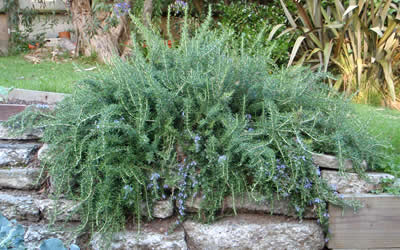Prostrate Creeping Rosemary - Rosmarinus |
|
|
Lamiaceae Rosmarinus Officinalis Prostratus |
|
| Price |
|
| Availability and Options |
Temporarily Out Of Stock This product is temporarily out of stock. Restocks typically occur at the beginning of each week. Check back soon and sorry for the inconvenience! Other Options: |
| Shipping Information |
Cannot ship to: Alaska, California, Hawaii, Oregon, Washington
|
| Grows In | Zone 8A · 10° to 15° F through Zone 11 · Above 40° F |
| Sun Exposure | Full / Mostly Sun, Morning Sun / Evening Shade, Morning Shade / Evening Sun |
| Soil Drainage | Well Drained, Moderately Drained |
| Resistent To | Deer Resistant, Drought, Insect, Disease, Mildew, Heat |
| Flower Color | Violet, Lavender, Sky Blue |
| Blooms | Summer Blooms, Fall Blooms |
| Foliage Color | Medium Green |
| Average Height | 0' to 1' |
| Average Width | 2' to 3' |
| Attracts | Visual Attention |
| Fragrances | Aromatic, Fragrant Foliage |
Rosmarinus Officinalis 'Prostratus' is a fast and moderate growing groundcover plant and herb that can be grown in USDA Plant Hardiness Zones 8A through 11. It matures to an average height of 1 inch to 1 foot and an average width of 2 feet to 3 feet, depending on climate and other environmental factors. It prefers growing in a location that provides full sun, morning sun with afternoon shade or morning shade with afternoon sun and grows best when planted in sand, loam, clay or silt soil that is well drained or moderately drained. In the summer and fall Prostratus Rosemary produces violet, lavender and sky blue flowers. The foliage is medium green in color. It attracts visual attention and is resistant to deer, drought, insects, diseases, mildew and heat. If you like fragrance, Rosmarinus Officinalis 'Prostratus' has fragrant foliage.
Prostratus Rosemary can be useful in the landscape in mass plantings, in containers or planters, as a border or edger, around decks, swimming pools, and other outdoor living areas, as a groundcover or in landscape beds or islands and also in rock or xeriscape gardens, theme gardens, cottage gardens, herb gardens or perennial gardens.
 More About Prostrate Rosemary...
More About Prostrate Rosemary...'Prostratus' is a low-growing and spreading form of Rosemary. Its leaves are dark green, leathery and very aromatic and pale lavender-blue flowers are produced in abundance during spring.
Rosmarinus officinalis ‘Prostratus’ can be used as a beautiful groundcover because of its height which reaches only up to about 2 feet with a spread of 4 to 8 feet. Creeping Rosemary will trail over walls and makes an excellent evergreen border in garden beds. It also wrks well in large containers where it will spill over the edges of pots.
Rosemary is easy to grow and appreciates well-drained soils and plenty of sun. Constantly soggy or wet soils can be problematic. Water as needed until fully established during its first year and then only occasionaly as needed. This is a nice plant for xeriscapes and combines well with Rudbeckia, Echinacea, Lantana, Verbena, and some Ornamental Grasses.
Maintenance is easy as well. If desired, lightly shear for shaping after flowering in spring and apply a general timed release fertilizer at that time. As with all varieties of rosemary, Prostrate performs very well in pots and may be brought indoors for winter use.